Pliny's Natural History (20 vols.)
Digital Logos Edition
Overview
As one of the largest and most comprehensive surviving works from the Roman Empire, Pliny the Elder’s Natural History offers a rare glimpse into the scholarship of the ancient world. In 37 books, Pliny the Elder—not to be confused with his nephew, Pliny the Younger—covers botany, zoology, astronomy, geology, geography, mineralogy, and how each of these interact with Roman life. Pliny the Elder claims to be the only Roman to ever attempt such a massive task, and to this day Natural History is a crucial source of information on the technological advances and nature of the Roman era.
As a naturalist, natural philosopher, naval and army commander, and personal friend of Emperor Vespasian, Pliny the Elder experienced much of the world for himself, but he also knew the importance of using established and trusted sources in scholarship. As a result, Pliny the Elder’s Natural History is essentially a detailed encyclopedia, and every encyclopedia since has followed its form in scope, depth, and use of original and reliable sources. For that reason, this text continues to provide scholars with valuable insights today.
This collection contains the complete texts in their Loeb Classical Library editions, translated by Harris Rackham. Each text includes the original Latin and the English translation for easy side-by-side comparison. Logos’ language tools allow you to go deeper into the Latin text and explore Pliny the Elder’s elegant language. Use the dictionary lookup tool to examine difficult English words used by the translator or challenging Latin words used by Pliny the Elder. Students of science, literature, anthropology, and history will enjoy these works and appreciate their significance.

- Loeb Classical Library editions
- 37 books of ancient knowledge
- The broadest selection of academia in Roman literature
For my part I deem those blessed to whom, by favor of the gods, it has been granted either to do what is worth writing of, or to write what is worth reading; above measure blessed on whom both gifts have been conferred. In the latter number will be my uncle, by virtue of his own and of your compositions.
- Title: Natural History
- Author: Pliny the Elder
- Translators: Harris Rackham, W. H. S. Jones, and D. E. Eichholz
- Series: Loeb Classical Library
- Publisher: Harvard University Press
- Volumes: 20
- Pages: 5,245
- Natural History, vol. 1: Books 1–2
- Natural History, vol. 1: Books 1–2: Latin Text
- Natural History, vol. 2: Books 3–7
- Natural History, vol. 2: Books 3–7: Latin Text
- Natural History, vol. 3: Books 8–11
- Natural History, vol. 3: Books 8–11: Latin Text
- Natural History, vol. 4: Books 12–16
- Natural History, vol. 4: Books 12–16: Latin Text
- Natural History, vol. 5: Books 17–19
- Natural History, vol. 5: Books 17–19: Latin Text
- Natural History, vol. 6: Books 20–23
- Natural History, vol. 6: Books 20–23: Latin Text
- Natural History, vol. 7: Books 24–27
- Natural History, vol. 7: Books 24–27: Latin Text
- Natural History, vol. 8: Books 28–32
- Natural History, vol. 8: Books 28–32: Latin Text
- Natural History, vol. 9: Books 33–35
- Natural History, vol. 9: Books 33–35: Latin Text
- Natural History, vol. 10: Books 36–37
- Natural History, vol. 10: Books 36–37: Latin Text
This title is included in the following collections
You can save when you purchase this product as part of a collection.
Loeb Classical Library Builder...
$1,269.18$508.99Classic Catholic Scholarship C...
$3,413.99$3,413.99Verbum 7 Portfolio Legacy Libr...
$4,749.99$4,749.99Classic Scholarship Collection...
$12,102.39$7,299.99

This volume contains Harris Rackham’s English translation of Pliny the Elder’s preface, as well as books one and two of Natural History. It includes a table of contents of the other books and authorities, as well as Pliny’s mathematical and metrological survey of the universe.

This volume contains the Latin text of Pliny the Elder’s preface, as well as books one and two of Natural History. These texts include a table of contents of the other books and authorities, as well as Pliny’s mathematical and metrological survey of the universe.

Natural History, vol. 2: Books 3–7
- Author: Pliny the Elder
- Translator: Harris Rackham
- Publisher: Harvard University Press
- Publication Date: 1942
- Pages: 332
This volume contains Harris Rackham’s English translation of books 3–7 of Natural History, an “Index of People,” and a “Geographical Index.” These texts cover the geography and ethnography of the known world, as well as the anthropology and physiology of man.
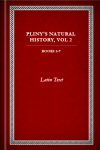
Natural History, vol. 2: Books 3–7: Latin Text
- Author: Pliny the Elder
- Translator: Harris Rackham
- Publisher: Harvard University Press
- Publication Date: 1942
- Pages: 332
This volume contains the Latin text of books 3–7 of Natural History. These texts cover the geography and ethnography of the known world, as well as the anthropology and physiology of man.

Natural History, vol. 3: Books 8–11
- Author: Pliny the Elder
- Translator: Harris Rackham
- Publisher: Harvard University Press
- Publication Date: 1940
- Pages: 308
This volume contains Harris Rackham’s English translation of books 8–11 of Natural History and an index. These texts discuss zoology.
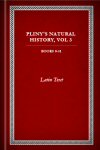
Natural History, vol. 3: Books 8–11: Latin Text
- Author: Pliny the Elder
- Translator: Harris Rackham
- Publisher: Harvard University Press
- Publication Date: 1940
- Pages: 308
This volume contains the Latin text of books 8–11 of Natural History. These texts discuss zoology.

Natural History, vol. 4: Books 12–16
- Author: Pliny the Elder
- Translator: Harris Rackham
- Publisher: Harvard University Press
- Publication Date: 1945
- Pages: 278
This volume contains Harris Rackham’s English translation of books 12–16 of Natural History and an “Index of Persons.” These texts discuss botany and agriculture.
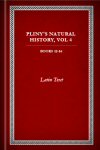
Natural History, vol. 4: Books 12–16: Latin Text
- Author: Pliny the Elder
- Translator: Harris Rackham
- Publisher: Harvard University Press
- Publication Date: 1945
- Pages: 278
This volume contains the Latin text of books 12–16 of Natural History. These texts discuss botany and agriculture.

Natural History, vol. 5: Books 17–19
- Author: Pliny the Elder
- Translator: W. H. S. Jones
- Publisher: Harvard University Press
- Publication Date: 1950
- Pages: 272
This volume contains W. H. S. Jones’s English translation of books 17–19 of Natural History and an index. These texts discuss horticulture.
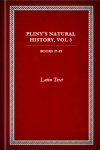
Natural History, vol. 5: Books 17–19: Latin Text
- Author: Pliny the Elder
- Translator: W. H. S. Jones
- Publisher: Harvard University Press
- Publication Date: 1950
- Pages: 272
This volume contains the Latin text of books 17–19 of Natural History. These texts discuss horticulture.

Natural History, vol. 6: Books 20–23
- Author: Pliny the Elder
- Translator: W. H. S. Jones
- Publisher: Harvard University Press
- Publication Date: 1951
- Pages: 266
This volume contains W. H. S. Jones’s English translation of books 20–23 of Natural History and an index. These texts discuss the medicinal purposes of various plants.
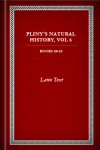
Natural History, vol. 6: Books 20–23: Latin Text
- Author: Pliny the Elder
- Translator: W. H. S. Jones
- Publisher: Harvard University Press
- Publication Date: 1951
- Pages: 266
This volume contains the Latin text of books 20–23 of Natural History. These texts discuss the medicinal purposes of various plants.

Natural History, vol. 7: Books 24–27
- Author: Pliny the Elder
- Translator: W. H. S. Jones
- Publisher: Harvard University Press
- Publication Date: 1956
- Pages: 279
This volume contains W. H. S. Jones’s English translation of books 24–27 of Natural History, “Additional Notes,” an “Index of Plants,” a “List of Diseases and Affections,” and an “Index of Names.” These texts discuss the medicinal purposes of various plants.
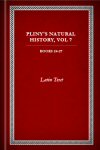
Natural History, vol. 7: Books 24–27: Latin Text
- Author: Pliny the Elder
- Translator: W. H. S. Jones
- Publisher: Harvard University Press
- Publication Date: 1956
- Pages: 279
This volume contains the Latin text of books 24–27 of Natural History. These texts discuss the medicinal purposes of various plants.

Natural History, vol. 8: Books 28–32
- Author: Pliny the Elder
- Translator: W. H. S. Jones
- Publisher: Harvard University Press
- Publication Date: 1963
- Pages: 304
This volume contains W. H. S. Jones’s English translation of books 28–32 of Natural History. These texts discuss medical zoology.
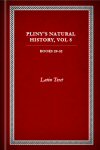
Natural History, vol. 8: Books 28–32: Latin Text
- Author: Pliny the Elder
- Translator: W. H. S. Jones
- Publisher: Harvard University Press
- Publication Date: 1963
- Pages: 304
This volume contains the Latin text of books 28–32 of Natural History. These texts discuss medical zoology.

Natural History, vol. 9: Books 33–35
- Author: Pliny the Elder
- Translator: Harris Rackham
- Publisher: Harvard University Press
- Publication Date: 1952
- Pages: 211
This volume contains Harris Rackham’s English translation of books 33–35 of Natural History, an “Index of Artists,” a “Museographic Index,” and an “Index of Minerals.” These texts discuss minerals, medicine, and the fine arts.
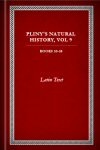
Natural History, vol. 9: Books 33–35: Latin Text
- Author: Pliny the Elder
- Translator: Harris Rackham
- Publisher: Harvard University Press
- Publication Date: 1952
- Pages: 210
This volume contains the Latin text of books 33–35 of Natural History. These texts discuss minerals, medicine, and the fine arts.

Natural History, vol. 10: Books 36–37
- Author: Pliny the Elder
- Translator: D. E. Eichholz
- Publisher: Harvard University Press
- Publication Date: 1962
- Pages: 184
This volume contains D. E. Eichholz’s English translation of books 36 and 37 of Natural History. These texts discuss different kinds of gemstones.
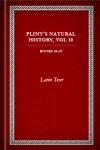
Natural History, vol. 10: Books 36–37: Latin Text
- Author: Pliny the Elder
- Translator: D. E. Eichholz
- Publisher: Harvard University Press
- Publication Date: 1962
- Pages: 184
This volume contains the Latin text of books 36 and 37 of Natural History. These texts discuss different kinds of gemstones.
Gaius Plinius Secundus (AD 23–79), was a naturalist, natural philosopher, naval and army commander, friend of the emperor, uncle of Pliny the Younger, and an avid writer. When he wasn’t studying or investigating the world around him, he was writing about it. Tacitus, Suetonius, and Pliny the Younger wrote about his life and his major contributions to Roman academia. His writings include History of the German Wars, The Student, On Doubtful Phraseology, Natural History, and other works, all of which are lost besides Natural History. Pliny the Elder died attempting to rescue a family friend from the eruption of Mount Vesuvius. Scholars are uncertain whether he died from the toxic fumes or natural causes.
Reviews
4 ratings

William L White
11/3/2014

Allen Bingham
6/18/2014

Larry Proffitt (I
5/29/2014

Bill Shewmaker
5/28/2014